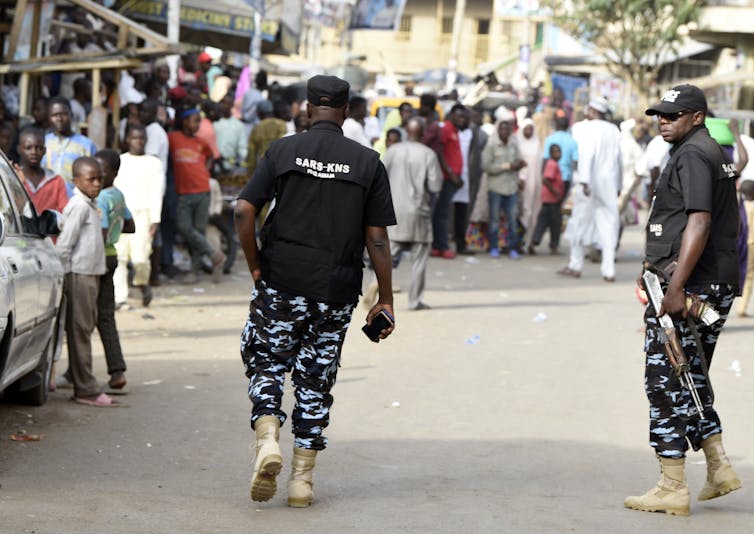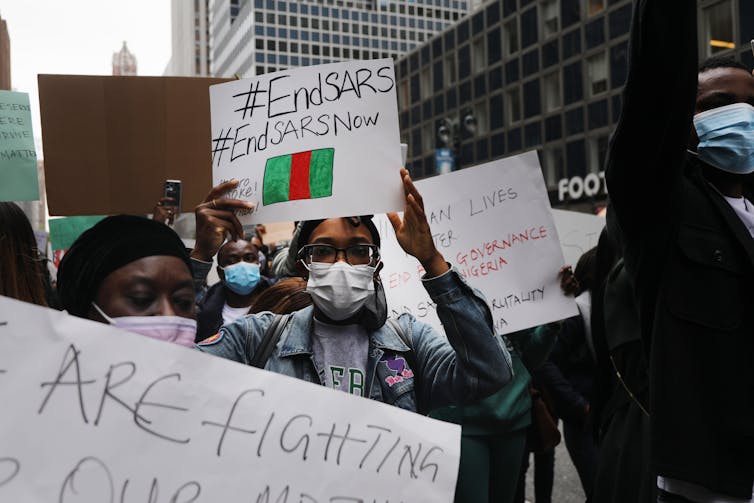Nigerians got their abusive SARS police force abolished – but elation soon turned to frustration
- Written by Samuel Fury Childs Daly, Assistant Professor of African and African American Studies, Duke University
For a brief moment in October, it seemed that youthful protesters calling to “abolish” a police force had succeeded. After weeks of mass demonstrations against police brutality, the government agreed to disband a widely hated police unit[1].
This was in Nigeria[2], not the United States. But the lessons from Nigeria have broad relevance for protesters elsewhere calling for major reforms to policing.
In Nigeria, it took just three weeks of mass demonstrations for President Muhammadu Buhari to announce he would eliminate the Special Anti-Robbery Squad[3], or SARS, the most reviled segment of the national Nigerian Police Force.
SARS officers were infamous for demanding bribes at checkpoints and for violent confrontations with civilians[4] that could end in death. Though heavily armed, SARS officers seldom wore uniforms. Many Nigerians struggled to distinguish[5] the police from the criminals they ostensibly pursued.
Buhari explained his decision to dissolve SARS by stating his “commitment to extensive police reforms[6]… to ensure that the primary duty of the police and other law enforcement agencies remains the protection of lives.”
At first, Nigerians were elated[7], if surprised: President Buhari, a former military dictator who in the 1980s imposed corporal punishment for minor infractions like jumping the line at bus stops[8], had caved to public pressure over policing.
Their joy was to be short-lived.
 Young protesters call for abolishing SARS at the Lagos State House of Assembly on Oct. 9.
Adekunle Ajayi/NurPhoto via Getty Images[9]
Young protesters call for abolishing SARS at the Lagos State House of Assembly on Oct. 9.
Adekunle Ajayi/NurPhoto via Getty Images[9]
History of police violence
In my research on the history of law enforcement in Nigeria[10], I’ve documented how durable its police institutions are, and how resistant to fundamental change.
The Nigeria Police Force dates back to British colonialism[11], which lasted until 1960. It is notoriously ineffective[12], and since it is a federal agency[13] its officers are usually not local to the places they patrol. Officers are poorly paid, which leads them to demand bribes and encourages other forms of corruption[14]. A lack of oversight means that police who abuse their power are seldom punished.
The Special Anti-Robbery Squad – the target of protesters’ recent ire – is a federal police force created during Nigeria’s long military dictatorship.
Military rule in Nigeria lasted from 1966 to 1999 with two brief interruptions, punctuated by the Nigerian Civil War[15] from 1967 to 1970. After the war, economic volatility and a glut of leftover firearms contributed to a spike in property crime.
Nigeria’s military rulers responded to a national crisis of armed robbery[16] by imposing martial law and making robbery a capital offense. SARS was established in 1992 as part of one such crackdown. But it endured after Nigeria returned to a civilian-led democracy in 1999.
Other law enforcement tools the military had used, like tribunals, continued after dictatorship, too, as did colonial-era punishments like corporal punishment by police[17].
#EndSARS
The mandate of SARS went beyond patrolling and investigating. It also made judgments about guilt and meted out punishment, just as policemen and soldiers had done during military rule. That punishment could entail torture, and even death[18], which human rights groups documented.
SARS officers also tormented Nigerians with more mundane harassment. They set up checkpoints to search cars and phones for “evidence” that they then used to demand bribes.
 SARS officers patrol a polling station in Kano, in northern Nigeria, during Nigeria’s 2019 presidential election.
Pius Utomi Ekpei/AFP via Getty Images[19]
SARS officers patrol a polling station in Kano, in northern Nigeria, during Nigeria’s 2019 presidential election.
Pius Utomi Ekpei/AFP via Getty Images[19]
In October 2020, a a video of the killing of a young man by SARS officers[20] in the town of Ughelli sparked long-standing opposition to SARS into a national cause. Online activism took #EndSARS international[21], and an avalanche of Twitter posts exhorted the Nigerian government to dissolve the force. Nigerians living abroad led protests[22] in New York and in front of many Nigerian embassies, garnering global media attention[23].
#EndSARS built on a long history of discontent with the Nigerian police[24]. While the movement in some ways recalled Black Lives Matter in the United States – which issued a statement in support of #EndSARS[25] – age rather than race was at its center. Its leaders argued that, as young people in a state run by elderly ex-soldiers, they were vulnerable to police harassment.
“Soro soke werey[26]” – a slang phrase roughly meaning, “speak up, madman” – was one of its slogans, an indictment of past generations for having tolerated police violence.
#EndSWAT
Two days after President Buhari agreed to disband SARS, celebration turned to disillusionment.
On Oct. 14, the Nigerian Police Force unveiled a new police squad, the Special Weapons and Tactics Team, or SWAT. The police promised SWAT would be “strictly intelligence-driven[27],” and that “no personnel from the defunct SARS will be selected to be part of the new tactical team.”
Activists suspected SWAT was a new label for an old institution, not a meaningful reform. Rather than clearing the streets[28], protests grew, in Nigeria and abroad. #EndSARS became #EndSWAT. On Oct. 20, soldiers opened fire[29] at an #EndSWAT protest in Lagos, killing at least 48.
 A protest against Nigeria’s SARS police force in New York City on Oct. 21.
Spencer Platt/Getty Images[30]
A protest against Nigeria’s SARS police force in New York City on Oct. 21.
Spencer Platt/Getty Images[30]
Six police officers have been killed on the job since the #EndSARS movement concluded[31], and the Lagos State government has compensated their families. Nothing has been paid to the families of the protesters who died. The Lagos State government opened a judicial commission of inquiry[32] to investigate the Oct. 20 killings, but such inquiries, which are merely advisory, have come to little in the past.
[Insight, in your inbox each day. You can get it with The Conversation’s email newsletter[33].]
Nigeria’s government has begun punishing the young organizers of #EndSARS, including by freezing their bank accounts and revoking their passports[34]. This, too, has echoes in the past. Financial penalties were imposed on the losing side of the Nigerian Civil War in the early 1970s[35], and military regimes regularly prevented their critics from leaving the country.
Nigeria’s story reveals a common pitfall of police reform movements that’s also been seen in the United States and beyond. Governments facing pressure to reform police may shuffle around personnel or rebrand maligned units[36] – but cosmetic changes cannot fix root problems that date back decades[37], even centuries.
References
- ^ widely hated police unit (www.aljazeera.com)
- ^ This was in Nigeria (www.fastcompany.com)
- ^ Special Anti-Robbery Squad (www.theguardian.com)
- ^ violent confrontations with civilians (www.vanguardngr.com)
- ^ struggled to distinguish (doi.org)
- ^ commitment to extensive police reforms (twitter.com)
- ^ Nigerians were elated (www.premiumtimesng.com)
- ^ minor infractions like jumping the line at bus stops (www.cfr.org)
- ^ Adekunle Ajayi/NurPhoto via Getty Images (www.gettyimages.com)
- ^ history of law enforcement in Nigeria (scholars.duke.edu)
- ^ dates back to British colonialism (doi.org)
- ^ notoriously ineffective (www.cfr.org)
- ^ federal agency (www.google.com)
- ^ forms of corruption (muse.jhu.edu)
- ^ Nigerian Civil War (doi.org)
- ^ national crisis of armed robbery (muse.jhu.edu)
- ^ corporal punishment by police (doi.org)
- ^ torture, and even death (www.amnesty.org)
- ^ Pius Utomi Ekpei/AFP via Getty Images (www.gettyimages.com)
- ^ a video of the killing of a young man by SARS officers (www.bbc.com)
- ^ #EndSARS international (www.billboard.com)
- ^ living abroad led protests (www.theguardian.com)
- ^ garnering global media attention (www.washingtonpost.com)
- ^ long history of discontent with the Nigerian police (www.washingtonpost.com)
- ^ issued a statement in support of #EndSARS (blacklivesmatter.com)
- ^ Soro soke werey (www.pulse.ng)
- ^ strictly intelligence-driven (twitter.com)
- ^ clearing the streets (www.washingtonpost.com)
- ^ opened fire (www.nytimes.com)
- ^ Spencer Platt/Getty Images (www.gettyimages.com)
- ^ since the #EndSARS movement concluded (guardian.ng)
- ^ judicial commission of inquiry (www.bbc.com)
- ^ You can get it with The Conversation’s email newsletter (theconversation.com)
- ^ freezing their bank accounts and revoking their passports (www.hrw.org)
- ^ in the early 1970s (www.cambridge.org)
- ^ shuffle around personnel or rebrand maligned units (www.yalelawjournal.org)
- ^ cannot fix root problems that date back decades (theconversation.com)
Authors: Samuel Fury Childs Daly, Assistant Professor of African and African American Studies, Duke University

